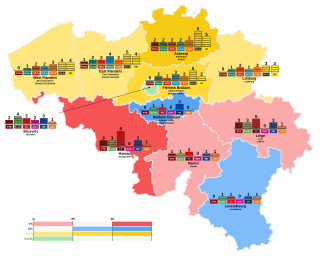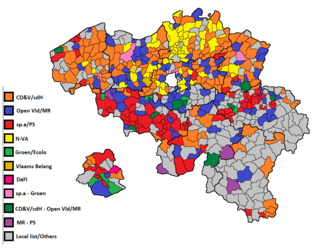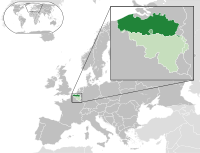
The Open Flemish Liberals and Democrats is a Flemish liberal political party in Belgium. The party has been described as centre-right and has smaller factions within the party that have conservative liberal and social liberal views. The party is a member of the Liberal Group, Renew Europe, and Liberal International.

Christian Democratic and Flemish is a Flemish Christian-democratic political party in Belgium. The party has historical ties to both trade unionism (ACV) and trade associations (UNIZO) and the Farmer's League. Until 2001, the party was named the Christian People's Party.

Groen, founded as Agalev, is a green Flemish political party in Belgium. The main pillars of the party are social justice, human rights, and ecologism. Its French-speaking equivalent is Ecolo; the two parties maintain close relations with each other.

The Federal Government of Belgium exercises executive power in the Kingdom of Belgium. It consists of ministers and secretary of state drawn from the political parties which form the governing coalition. The federal government is led by the prime minister of Belgium, and ministers lead ministries of the government. Ministers together form the Council of Ministers, which is the supreme executive organ of the government.

The Flemish Government is the executive branch of the Flemish Community and the Flemish Region of Belgium. It consists of a government cabinet, headed by the Minister-President and accountable to the Flemish Parliament, and the public administration divided into 13 policy areas, each with an executive department and multiple agencies.

Jan Jambon is a Belgian businessman and politician of the New Flemish Alliance (N-VA) who served as Minister-President of Flanders from 2019 to 2024. He replaced Kris Peeters as a member of the Belgian Chamber of Representatives in 2007. The N-VA was, at that time, partnered with the Christian-Democratic and Flemish party. In June 2010 and May 2014 he was re-elected on an N-VA list.

The Belgian provincial, municipal and district elections of 2012 took place on 14 October. As with the previous 2006 elections, these are no longer organised by the Belgian federal state but instead by the respective regions:
Following the simultaneous federal elections and regional elections of 25 May 2014, negotiations started to form a new Federal Government as well as new regional governments: a Flemish, Walloon, French Community and Brussels Government. A Government of the German-speaking Community was formed only a few days after the elections.

The Bourgeois Government (Regering-Bourgeois) was the Flemish Government formed following the 2014 Flemish Parliament election. The cabinet consisted of a centre-right coalition of the nationalist New Flemish Alliance (N-VA), the Christian Democratic and Flemish party (CD&V) and the Open Flemish Liberals and Democrats. It had a large majority in the Flemish Parliament and the main opposition parties were the Socialist Party (sp.a), which had been part of nearly all previous governments in recent history, and the Green party.

The Council of Ministers is the supreme executive organ of the Federal Government of the Kingdom of Belgium. It is a cabinet composed of the Prime Minister, who leads it, and up to fourteen senior ministers. Federal secretaries of state are members of the government, but not part of the Council. The King of the Belgians historically presided over the Council, but this has not happened since 1957. The Council of Ministers formally became a permanent policy structure with the constitutional revision of 1970.

Federal elections were held in Belgium on 26 May 2019, alongside the country's European and regional elections. All 150 members of the Chamber of Representatives were elected from eleven multi-member constituencies.

The Belgian provincial, municipal and district elections of 2018 took place on Sunday 14 October 2018. They are organised by the respective regions:

The Michel II Government was the Federal Government of Belgium, led by Prime Minister Charles Michel from 18 December 2018 until 27 October 2019 when it was succeeded by the Wilmès I Government. It was a centre minority coalition cabinet of Christian Democratic and Flemish (CD&V), the Open Flemish Liberals and Democrats and the Reformist Movement (MR). On 26 October 2019, it was announced that Sophie Wilmès would take over the role of Prime Minister from Michel on 1 November 2019, and form a new government.

The Homans Government (Regering-Homans) was the interim Flemish Government formed and sworn in on 2 July 2019, following the departure of Flemish Minister-President Geert Bourgeois who took up his seat in the European Parliament following the 2019 European Parliament election in Belgium. It was replaced by the Jambon Government on 2 October 2019.
In Belgium, the government formation of 2019–2020 started one day after the federal elections, regional elections and European elections which were all held simultaneously on 26 May 2019. These formations were only the second under King Philippe.

The De Croo Government is the incumbent Federal Government of Belgium, led by Prime Minister Alexander De Croo since 1 October 2020. It has acted in a caretaker capacity since the resignation of Prime Minister Alexander De Croo on 10 June 2024 following the 2024 Belgian federal election.

Sihame El Kaouakibi is a Belgian politician and the founder of the Let's Go Urban project. In 2021, she was accused of fraudulent use of government subsidies. Almost 1 million euro is claimed to have been used for her own profit.

Egbert R. Lachaert is a Belgian lawyer, politician and was party chairman of the Open VLD.

Federal elections were held in Belgium on 9 June 2024. The Chamber of Representatives received 150 members with five-year terms. European and regional elections took place on the same day.



















